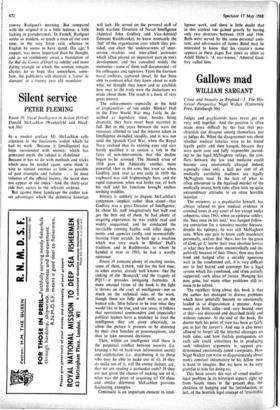Silent service
PETER FLEMING
Room 39: Naval Intelligence in Action 1939-45 Donald McLachlan (Weidenfeld and Nicol- son 50s)
In a modest preface Mr McLachlan calls attention to the limitations within which he had to work. 'Because it [intelligence] has been surrounded with secrecy, which has generated myth, the subject is ill-defined . . . Because it has to do with methods and tricks which may be needed again, some think it wise to remind enemies as little as possible of past triumphs and failures . . . In most volumes of the official history, the word does not appear in the index.' And the thirty-year rule bars access to the relevant archives.
But against these handicaps the author can set advantages which the definitive historian will lack. He served on the personal staff of both wartime Directors of Naval Intelligence (Admiral John Godfrey and Vice-Admiral Edmund Rushbrooke), he knew intimately the `feel' of the organisation over which they pre- sided, can chart the undercurrents of inter- service rivalries and inter-allied jealousies which often played an important part in Nun's development, and has consulted widely the memories—some of them well documented—of his colleagues and superiors. From the German naval archives, captured intact, he has been able to contrast what they knew about us with what we thought they knew and to establish how near to the truth were the deductions we made about them. The result is a book of very great interest.
The achievements—especially in the field of cryptanalysis—of NID under 'Blinker' Hall in the First World War may fairly be de- scribed as legendary since, besides being dramatic, they have never been recorded in full. But in the years between the wars the resources allotted to and the interest taken in Intelligence dwindled steadily, and it was not until the Spanish Civil War, when the Royal Navy realised that its existing eyes and ears barely qualified it to sustain a role in the farce of non-intervention, that this decline began to be arrested. The Munich crisis of 1938 gave the Admiralty another, more powerful, shot in the arm; but, even so, when Godfrey took over as DNI early in 1939 the cupboard was still frighteningly bare, and the rapid expansion, when war broke out, of both his staff and his functions brought endless teething troubles.
History is unlikely to dispute McLachlan's contention—implicit rather than stated—that Godfrey was a great Director of Intelligence; he chose his staff imaginatively but well and got the best out of them, he had plenty of seagoing experience, he was widely read and widely acquainted, and he conducted the inevitable running battles with other depart- ments and agencies coolly and resourcefully.
Starting from scratch, he built up a machine which was very much in 'Blinker' Hall's tradition; and in Rushbrooke, to whom be handed it over in 1943, he had a worthy successor.
Room 39 contains plenty of exciting stories, some of them, I think, told for the first time; to other stories, already well known—like the sinking of the 'Bismarck' and the tragedy of PQ17—it provides intriguing footnotes. A more unusual virtue of the book is the light it throws on the craft of intelligence—not so much on the technical sides of the work, though these are fully dealt with, as on the human side. Men believe to be true what they would like to be true, and vice versa; it follows that operational commanders and (especially) political leaders have a tendency to treat the intelligence they are given selectively, to allow the picture it presents to be distorted by their own hunches or preconceptions, and thus to take unsound decisions.
Then, within an intelligence staff there is- the perpetual conflict between security (i.e. keeping a bit of hard-won information secret) and exploitation (i.e. distributing it to those who may be able to make use of it). If they do make use of it, will the enemy deduce, say, that we are reading a particular code? If they are not given the chance of making use of it, what was the point of acquiring it? Of these and similar dilemmas McLachlan provides fascinating examples.
Continuity is an important element in Intel- ligence work, and there is little doubt that in this context NID gained greatly by having only two directors between 1939 and 1946. Both were served by the same personal assis- tant, and aficionados of James Bond may be interested to know that his creator's name appears in these pages five times as often as Adolf Hitler's. 'A war-winner,' Admiral God- frey called him.






































 Previous page
Previous page